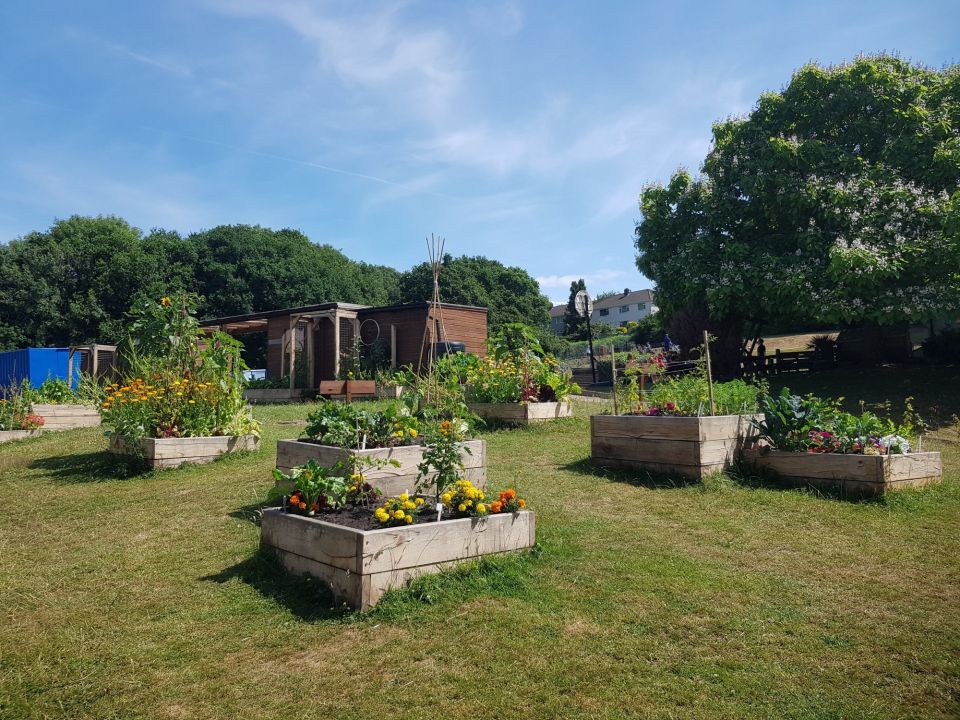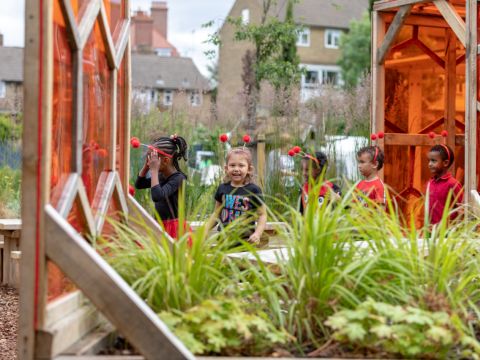Edible Playgrounds
How Edible Playgrounds Can Cultivate Mental Wellbeing
Cardiff, Wales
The UK is currently grappling with a significant mental health crisis, with reports indicating that 1 in 5 children in 2023 were affected by a probable mental disorder, according to NHS England statistics. In tandem with this crisis in children's mental health, teachers are experiencing elevated levels of stress in their roles (Mental Health UK). Among the various factors contributing to this decline in mental wellbeing among pupils and teachers, Nature Deficit Disorder has emerged as a significant concern.
What is Nature Deficit Disorder?
Coined by Louv in 2005, Nature Deficit Disorder (NDD) refers to the growing disconnect between humans and the natural world, leading to a myriad of problems. With children today spending more time inside than ever before (Child Mind UK), and the worsening mental health crisis, Louv’s theory is becoming more relevant.
Trees for Cities as an organisation strives to engage people with their accessible green spaces, whether that is in schools or a local park. We know that nature is amazing, but how do our projects impact the mental wellbeing of those we work with?
Functioning Well and Feeling Good
According to the Warwick–Edinburgh Mental Wellbeing Scale (WEMWBS) mental health is on a scale covering the ‘feeling’ and 'functioning’ aspects of wellbeing. The former encompasses positive emotions, a sense of purpose, relaxation, happiness, and social connection. On the other hand, 'functioning well' refers to one's ability to cope with stress, process emotions, make choices, and exhibit resilience to change.
Many of these aspects of mental wellbeing are relevant to the aims of our Edible Playgrounds Programme - part of our Schools programme in which Trees for Cities build an outdoor classroom and provide engagement and training to schools to facilitate time in nature and learning new skills outside.

Edible Playgrounds: Feeling Good
At some of our Edible Playground schools in Cardiff, the theme of wellbeing has been significant through observations and discussions in teacher interviews and pupil focus groups. In particular, these interviews and discussions highlight ways in which the Edible Playground can help pupils to ‘feel good’ by connecting them to nature.
Not only does connection to nature reduce the prevalence of NDD, but spending time in these outdoor spaces can provide tangible mental health benefits. Studies have shown that activities like gardening and playing in soil can lead to the release of serotonin in the brain (Earth Trust 2023;Sustainable Soils Alliance), resulting in reduced stress levels and improved moods. Testimonials from school staff and pupils underscored the mood-boosting effects of our Edible Playgrounds.
In the interviews, pupils repeatedly share feeling calm, happy and safe when utilising their edible playground: “I feel safe and happy in the garden” reports one pupil, with another similarly stating “I feel happy. I like to look at the plants growing”. School staff echo these sentiments - one staff member notes the positive emotions they themselves felt in the Edible Playground stating that they ‘absolutely love it’ and feel ‘just as excited as the kids’ demonstrating the ‘feel good’ powers of time spent learning outdoors.
I feel happy. I like to look at the plants growing and getting to plant stuff.
Student in a school that has an Edible Playground
Edible Playgrounds: Functioning Well
As well as fostering positive emotions, Edible Playgrounds also contribute to the 'functioning well' aspect of mental wellbeing. Pupils report using the outdoor space as a means to regulate their emotions, providing a calming environment for processing negative feelings, with one pupil stating that “every time I’m frustrated, I can go to the Edible Playground”. This shows that a calming and green outdoor playground can provide students with a space to step away from stresses and learn how to self-regulate.
The children are overexcited at first but after two minutes they calm down. They are busy in the soil, it’s grounding for them.
Staff member at Cardiff school

School staff also highlighted the value of the Edible Playground as a sensory space for pupils with special educational needs as the environment ‘settles’ pupils and is a ‘calming’ space.
The grounding nature of outdoor activities, such as gardening, not only helps children to cope with their emotions but can also instil confidence and responsibility in caring for plants (Child Mind UK). Staff members themselves have also shared their own personal growth and increased confidence from engaging with the Edible Playgrounds, highlighting the multifaceted benefits of outdoor learning environments for both school staff and pupils.
Nature Connection
By providing accessible outdoor spaces for learning and play, initiatives like our work in schools can address the challenges posed by Nature Deficit Disorder and contribute to positive mental health outcomes. Prioritising outdoor experiences in education can play a crucial role in nurturing the wellbeing of current and future generations, fostering a deeper connection with nature and promoting improved mental wellness.

Discover more of our recent work in Cardiff schools, including results from a survey where 100% of the schools featured now incorporate Healthy Playground related-projects into termly curriculum plans.
Food Growing Resources
Alongside the delivery of the Cardiff programme, we also translated our food growing resources into Welsh. Click here to download them for your school.
Download hereOur School Work
Find out more about the green and healthy initiatives we carry out in schools across the UK!
Learn moreDonate to Trees for Cities and together we can help cities grow into greener, cleaner and healthier places for people to live and work worldwide.
Donate
